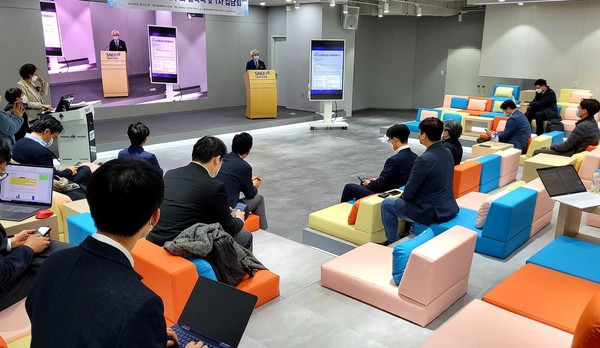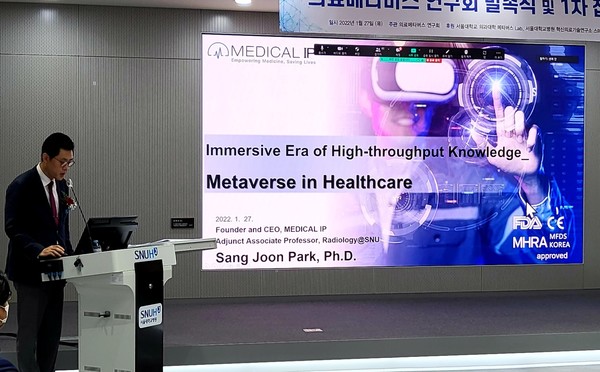The medical community recently inaugurated a society to research how to apply metaverse, a convergence of virtual and physical space, to the healthcare sector.
On Thursday, professors from the Seoul National University College of Medicine launched the “Medical Metaverse Research Society.”

The group aims to search for ways to use metaverse in patient care and medical education and link it with the tech industry to solve problems in the clinical field. It will also seek to nurture medical metaverse experts and create a virtuous cycle between the tech industry and healthcare.
At the society inauguration ceremony, professor Park Chul-kee of the Neurosurgery Department at the Seoul National University Hospital, who leads the group, said metaverse was in the early development stage. Still, it would be part of people’s lives in all healthcare fields, including medical education, disease diagnosis and treatment, and disease prevention.
“The essence of the metaverse is ‘togetherness.’ If it is possible to share and experience a specific three-dimensional space and time, whether in reality or virtual reality, with other people, it is a metaverse,” Park said.
If members of the medical metaverse research association work together, they will find out how metaverse will affect the healthcare field soon, he added.
Kim Jeong-eun, dean of the SNU College of Medicine, said the medical school and the SNUH had many researchers working hard to develop and apply metaverse technologies such as virtual reality, augmented reality, digital therapeutics, and telehealth.
“I hope these efforts could be realized at the research society through metaverse, which is an integrated platform,” he said.
Medical IP CEO Park Sang-joon, who also serves as an adjunct associate professor of the Radiology Department at the SNU College of Medicine, spoke on how metaverse should be used in future healthcare with his presentation, “Immersive era of high-throughput knowledge: Metaverse in Healthcare.”

Medical IP, a medical metaverse company based on AI-powered analysis technology, is the first venture firm spun off from the SNUH.
Park said metaverse is a new method to meaningfully use patients’ healthcare information. In technological development, he said its emergence and importance had already been predicted.
Park defined metaverse as interaction with digitized patient information using sensors as a medium. Just like people upload their comments and photos on social media and share their daily lives, in the future, lifelog data of patients will be recognized through their hospital visits, he explained.
“According to the ‘Hype Cycle’ indicating the technology maturity level, AI, AR, and VR technologies have already been developed and verified in 2017. Those technologies didn’t appear overnight,” Park said.
Hype Cycle forecast that if people make a digital platform using AI using existing AR and VR devices, new technologies in the clinical environment would appear, he went on to say. “The emergence of the metaverse was predicted by AI-backed healthcare innovation.”
The medical community’s interest in technology started a long time ago.
Park took an example of a 1998 paper by the Chung-Ang University Hospital on the experience of using “Adam,” an anatomy education program using CD-ROM.
“At the time, the authors said Adam was not beneficial because the computer-based education was not very different from cadaver training. But, they noted that such experience could be an opportunity (for medical advancement),” Park said.
What was important was that doctors had much interest in advanced technologies even in the late 1990s, he said.
He predicted that medical metaverse would become a tool in viewing patients’ treatment history, medical simulation, clinical practice, and medical education.
“In the end, medical metaverse will be advanced through existing technologies and integrated with new themes like telehealth and digital therapeutics.”

